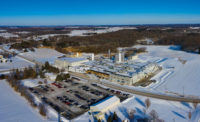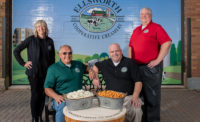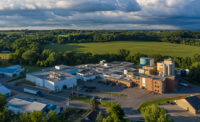Some people — including, most famously, Steve Jobs — say that it is better to focus on one thing and do it well. Off a nondescript state highway in east-central Wisconsin, Baker Cheese Inc. is proving the adage to be true. The 104-year-old cheese company produces over 200 SKUS (see Inside the Plant story), but all its product lines come down to one basic concept: quality low-moisture, part-skim mozzarella string cheese.
The St. Cloud, Wis.-based company — one of only a handful of string cheese processors in the United States — didn’t always focus its production on the snacking cheese. However, while the company has evolved over the past century, its ownership has stayed close to home. The present leaders are the fourth generation of Bakers to run the company, so it is easy to assume the current crop has been planning for this since they were children.
“I can speak personally; that was not on my horizon,” says Jeff Baker, executive vice president.
Adds Brian Baker, president and CEO: “It wasn’t on mine, either.”
In fact, none of the family members on today’s executive team — which includes Jeff Baker and Brian Baker, along with their brother Kevin Baker, chief financial officer, and their cousin Eric Baker, vice president of marketing and sales — intended for Baker Cheese to be their career.
“There was no plan. All four of us went off to college independently to do what we wanted to do,” explains Brian Baker. “It just kind of organically happened at each person’s pace.”
A heritage of cheesemaking
Baker Cheese was started in 1916 by the fourth generation’s great-grandfather, Frank Baker. After completing a cheesemaking apprenticeship, he bought a small factory in St. Cloud, where the company still is located today.
“It was just himself and his right-hand woman, which was his wife, our great-grandmother, and they ran a one-vat operation of cheddar manufacturing,” Brian Baker says.
For the next few decades, Baker Cheese remained a small cheddar operation. That started to change when Frank Baker’s son, Francis, returned from World War II and got involved in the family business. In the post-war era in the early 1950s, there was a new demand for Italian cheeses, and Baker Cheese’s sole customer asked if it would consider adding mozzarella to its repertoire.
“So they did both for a little while, cheddar and mozzarella, and then just converted themselves completely over to mozzarella,” Brian Baker notes.
Up until the mid-1960s, Baker Cheese focused on loaves and blocks. Then it decided to take on small cuts of mozzarella for the retail market. Some of these products were made under the Baker brand name, but the company already was starting to partner with private label customers, Brian Baker explains.
At the end of the 1960s through the 1970s, the third generation of Bakers — the current generation’s fathers — started coming into the family business. Another important transition happened at this time: The company discovered string cheese.
As the story goes, Francis Baker was at a deli in California and saw people in the back room stretching and pulling mozzarella into ropes. According to Brian Baker, his grandfather saw an opportunity to bring this cheesemaking process back to California, as the Baker Cheese plant already was producing mozzarella cheese.
“The third generation was all here at that point,” adds Brian Baker. “And they worked with our grandpa and kind of worked through how to make that.”
In January 1977, Baker Cheese produced its first string cheese, notes Jeff Baker. At that point, the family wasn’t even sure if it would be a successful product. The company was primarily a manufacturer, not a merchandiser, so it tried a homegrown approach to product testing.
“They went around [to] parties, to some bars, little locations and just kind of handed it out [and asked] ‘Hey, do you like this product? What do you think?’” says Brian Baker. “They got some nice feedback from it and decided that, ‘We could probably sell this.’”
According to Eric Baker, they even made tabletop displays at local bars that included string cheese along with beer bucket deals.
“It was kind of very rudimentary; it was marketing 101,” he adds.
Exponential growth
Once it was clear that string cheese could be a popular product, Baker Cheese began to manufacture it under its Baker brand. It was the first company in the Midwest to produce the snackable cheese, notes Brian Baker, and the offering resonated really well with Wisconsin consumers.
“After a few years of that, [Baker Cheese] recognized that there might be a better opportunity to get it out to the market a little bit more by partnering up with companies with their own brands,” explains Brian Baker. “We still had our Baker brand; we were still marketing it in Wisconsin, but we thought that to get it out there, a lot more partnering up with other people’s brands would help the category.”
With the help of its partners, which invested in marketing and new packaging styles such as individually wrapped cheeses, string cheese grew in popularity across the country. In 1985, Baker Cheese invested in a large plant expansion that would allow it to produce even more of the cheese sticks.
In the early 1980s, around 15% of the 3 million pounds of cheese Baker Cheese made a year was string cheese. By the mid-1980s, it was 50%, and by the end of the 1990s, it was 90%.
Today, the Baker Cheese plant produces only string cheese, and a lot of it: The company makes 47-50 million pounds of cheese annually. The company’s production grew 500% in the past 20 years, Brian Baker says. It also added 160 employees.
In addition to the 1985 plant update, Baker Cheese invested in five other expansions, which brought its plant up to its current size of 172,000 square feet, explains Brian Baker.
Kevin Baker says it is thanks to the previous generation’s skillful planning for the future that Baker Cheese has been able to grow into the large company it is now.
“It’s really just a constant reinvestment between the generations,” he notes.
Beyond string cheese
While Baker Cheese produces only string cheese, it makes it in many different forms. It produces a plethora of sizes of the cheese snacks, different flavors such as jalapeño and smoked, cheese meeting different certifications such as organic and kosher, and more. (In fact, organic string cheese is a key part of the company’s business.)
“So it’s anything in that string cheese category, and we’re continuing to grow,” Brian Baker says.
While the Baker brand is the best-selling string cheese in Wisconsin, 90% of Baker Cheese’s products are made for private label customers. The company produces cheese for retail grocery store, c-store and club store customers, as well as foodservice customers.
“We’re seeing a lot of school business,” Eric Baker adds. “Over the past probably two to three years, we’ve seen tremendous growth within that area.”
Exports are another area of business. However, the company is experiencing tremendous growth in the U.S. market, so it does not focus a lot of energy on international opportunities. Baker Cheese’s products currently are in all 50 states, Brian Baker notes.
To bring new products to market, Baker Cheese utilizes its research and development team, which consists of two of its expert cheesemakers, along with Eric and Jeff Baker. While the company sometimes conducts product development on its own, private label customers often spearhead the process by asking for something new, Jeff Baker says.
An advantage of Baker Cheese’s size is that product development can happen quickly, without layers of bureaucracy, notes Eric Baker. The most important thing to the company is that any new products are of the same high quality.
“We spent probably two years with our jalapeño string cheese — trying different flavors, trying different ways to do it, trying different temperatures,” Eric Baker says. “So our processes, although not formal, comes back to that quality; we’re not going to launch a product unless it meets our expectations. That’s why it took us so long to launch [the jalapeño cheese], because we didn’t like the flavor profile.”
According to Eric Baker, the company hasn’t had the capacity to market the jalapeño flavor yet, but it is one of its goals for 2020. And the cheese already has won awards.
Differentiating factors
The quality of Baker Cheese’s string cheese is one of the factors that Eric Baker says attracts potential private label partners. As it is the only type of cheese the company produces, its focus is on getting it right.
“Every day that’s all we think about,” says Eric Baker. “Our whole entire conversation revolves around the quality of our string cheese.”
Part of producing high-quality string cheese is ensuring product freshness. The cheese needs to be immediately packaged after it is taken out of the brine. According to Brian Baker, it is a “non-negotiable” for the company to produce high-quality products. Thus, Baker Cheese won’t agree to take on new business unless it knows it has the capacity to produce the cheese well. In recent years, the company has had to say no to a lot of potential clients because it was capacity-constrained.
Another differentiating factor is Baker Cheese’s customer service, notes Eric Baker. If a customer has an issue, they will be able to speak directly to him or Brian Baker to resolve it quickly.
“They don’t have to go through different layers,” he adds.
Jeff Baker concurs.
“Service and quality. That’s usually the difference-maker [as to] whether we get an account or not,” he says.
In recent years, while Baker Cheese wanted to grow, Brian Baker says the priority was protecting these core assets.
“We had a lot of pent-up demand. We were telling customers no,” he adds. “We could grow a little bit each year with some operational improvements, but we needed the space.
Room for more
With the 2019 plant expansion, Baker cheese once again has the capacity to take on new business, Jeff Baker says. It is once again taking calls from potential new partners.
“For a lot of years, we were just growing with our existing base, and that’s as much as we could do,” he adds.
Now that it has room for new customers, Baker Cheese is considering new approaches to marketing itself.
“I would say, historically, our business model from growth has been customers or opportunities coming to us more than us going to them,” says Brian Baker. “With our added capacities, and wanting to continue to grow over the next three to 10 years because we have that capacity, now Eric’s starting to embark on some direct type of marketing opportunities to continue to get our name out there and try to find new partnerships.”
However, for getting new customers, Eric Baker says word of mouth is king.
“I can’t tell you how many calls I get that say, ‘Hey, I was looking for string cheese, and they recommended Baker Cheese first,’” he adds.
Brian Baker says he is confident that with its new production capacity, Baker Cheese will be able to grow more quickly in the upcoming years.
“We’ve grown at about 10% in the last five years, where we probably could have grown 25% if we had the capacity,” he explains. “We make around 47 million to 50 million pounds of cheese a year. Moving into [the new plant], we’ll be able to add 30% to 40% to that in a couple of years if we are able to find the sales and the partnerships.”
Planning for the future
While the fourth generation of Bakers didn’t intend on careers in the family business, they do recognize that it is due to their parents’ succession planning that Baker Cheese has been successfully passed on to them.
“They made many great decisions through the years, including the ‘99 plant addition,” says Jeff Baker. “You don’t make that third-generation decision hoping you’re going to sell; you make that decision going, ‘Hey, I would love for it to continue to the fourth generation.’”
Kevin Baker notes that while there was a plan in place, there was no expectation. It is with this attitude that the three brothers and their cousin have approached a potential fifth generation. Their kids — just like them — grew up or are growing up in houses right by Baker Cheese’s headquarters. Some have already had summer jobs at the company.
“You have to plan for it, with no expectation from that current ownership or from the next generation that it’s happening,” adds Kevin Baker. “But you plan for it so you can enable it to happen.”
While the Bakers say they would love for a fifth generation of Baker Cheese ownership, any new additions to the family team would be a ways off; the oldest member of that generation has yet to graduate college.
“But in fairness, my 8-year-old and 5-year-old are kinda [already] working up here,” jokes Eric Baker.








